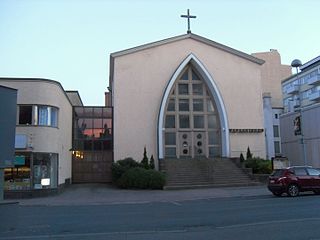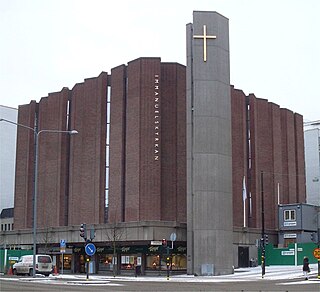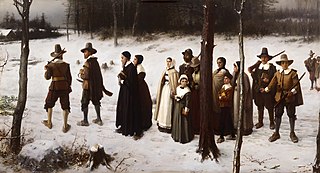
Presbyterianism is a Reformed (Calvinist) Protestant tradition named for its form of church government by representative assemblies of elders. Other Reformed churches are organised in a similar way, but the word Presbyterian, when capitalized, is applied to churches that trace their roots to the Church of Scotland or to English Dissenter groups that formed during the English Civil War.
The Holiness movement is a Christian movement that emerged chiefly within 19th-century Methodism, and to a lesser extent influenced other traditions such as Quakerism, Anabaptism, and Restorationism. The movement is historically distinguished by its emphasis on the doctrine of a second work of grace, generally called entire sanctification or Christian perfection and by the belief that the Christian life should be free of sin. For the Holiness movement, "the term 'perfection' signifies completeness of Christian character; its freedom from all sin, and possession of all the graces of the Spirit, complete in kind." A number of evangelical Christian denominations, parachurch organizations, and movements emphasize those beliefs as central doctrine.

The Evangelical Covenant Church (ECC) is a Radical Pietistic denomination of evangelical Christianity. The denomination has 129,015 members in 878 congregations and an average worship attendance of 219,000 people in the United States and Canada with ministries on five continents. Founded in 1885 in North America by Swedish immigrants, the church is now one of the most rapidly growing and multi-ethnic denominations on the continent.

The Evangelical Free Church of America (EFCA) is an evangelical Christian denomination in the Radical Pietistic tradition. The EFCA was formed in 1950 from the merger of the Swedish Evangelical Free Church and the Norwegian-Danish Evangelical Free Church Association. It is affiliated with the International Federation of Free Evangelical Churches.

A united church, also called a uniting church, is a denomination formed from the merger or other form of church union of two or more different Protestant Christian denominations, a number of which come from separate and distinct denominational orientations or traditions. Multi-denominationalism, or a multi-denominational church or organization, is a congregation or organization that is affiliated with two or more Christian denominations, whether they be part of the same tradition or from separate and distinct traditions.

The Evangelical Presbyterian Church in England and Wales (EPCEW) is a reformed and conservative evangelical Presbyterian denomination based in England and Wales with churches in Germany, Switzerland, and Sweden. Founded in 1996, the denomination is small but growing.

A free church is any Christian denomination that is intrinsically separate from government. A free church neither defines government policy, nor accept church theology or policy definitions from the government. A free church also does not seek or receive government endorsements or funding to carry out its work. The term is only relevant in countries with established state churches. Notwithstanding that the description "free" has no inherent doctrinal or polity overtones. An individual belonging to a free church is known as a free churchperson or, historically, free churchman.

Protestant denominations arrived in the Philippines in 1898, after the United States took control of the Philippines from Spain, first with United States Army chaplains and then within months civilian missionaries.

The Mission Covenant Church of Sweden, founded in 1878, was a Swedish evangelical free church in the Radical Pietist tradition. It was the second-largest Protestant denomination in Sweden, after the national church, the Church of Sweden. In 2011, the Mission Covenant Church of Sweden completed a merger with two other denominations, resulting in the new denomination Uniting Church in Sweden. The denomination was a member of the Swedish Free Church Council, the International Federation of Free Evangelical Churches, and the World Communion of Reformed Churches.
The Christian Holiness Partnership is an international organization of individuals, organizational and denominational affiliates within the holiness movement. It was founded under the leadership of Rev. John Swanel Inskip in 1867 as the National Camp Meeting Association for Christian Holiness, later changing its name to the National Holiness Association, by which it was known until 1997, when its current name was adopted. Its stated purpose is to promote "the message of scriptural holiness" primarily through evangelistic camp meetings. The Christian Holiness Partnership is headquartered in Clinton, Tennessee.

The World Communion of Reformed Churches (WCRC) is the largest association of Reformed (Calvinist) churches in the world. It has 230 member denominations in 108 countries, together claiming an estimated 80 million people, thus being the fourth-largest Christian communion in the world after the Catholic Church, Eastern Orthodox Church, and the Anglican Communion. This ecumenical Christian body was formed in June 2010 by the union of the World Alliance of Reformed Churches (WARC) and the Reformed Ecumenical Council (REC).
The Evangelical Church of North America (ECNA) is a Wesleyan-Holiness, Protestant Christian denomination headquartered in Clackamas, Oregon. As of 2000, the Church had 12,475 members in 133 local churches. The Church sponsors missionaries in seven countries.

Christianity is the most prevalent religion in the United States. Estimates from 2021 suggest that of the entire U.S. population about 63% is Christian. The majority of Christian Americans are Protestant Christians, though there are also significant numbers of American Roman Catholics and other Christian denominations such as Latter-day Saints, Orthodox Christians and Oriental Orthodox Christians, and Jehovah's Witnesses. The United States has the largest Christian population in the world and, more specifically, the largest Protestant population in the world, with nearly 210 million Christians and, as of 2021, over 140 million people affiliated with Protestant churches, although other countries have higher percentages of Christians among their populations. The Public Religion Research Institute's "2020 Census of American Religion", carried out between 2014 and 2020, showed that 70% of Americans identified as Christian during this seven-year interval. In a 2020 survey by the Pew Research Center, 65% of adults in the United States identified themselves as Christians. They were 75% in 2015, 70.6% in 2014, 78% in 2012, 81.6% in 2001, and 85% in 1990. About 62% of those polled claim to be members of a church congregation.
Evangelical Free Church can refer to the Evangelical Free Church of America, an evangelical Protestant denomination based in the United States.

The United Church of Christ in the Philippines is a Christian denomination in the Philippines. Established in its present form in Malate, Manila, it resulted from the merger of the Evangelical Church of the Philippines, the Philippine Methodist Church, the Disciples of Christ, the United Evangelical Church and several independent congregations.

Protestantism is the largest grouping of Christians in the United States, with its combined denominations collectively comprising about 43% of the country's population in 2019. Other estimates suggest that 48.5% of the U.S. population is Protestant. Simultaneously, this corresponds to around 20% of the world's total Protestant population. The U.S. contains the largest Protestant population of any country in the world. Baptists comprise about one-third of American Protestants. The Southern Baptist Convention is the largest single Protestant denomination in the U.S., comprising one-tenth of American Protestants. Twelve of the original Thirteen Colonies were Protestant, with only Maryland having a sizable Catholic population due to Lord Baltimore's religious tolerance.

The Evangelical Wesleyan Church, formerly known as the Evangelical Wesleyan Church of North America, is a Methodist denomination in the conservative holiness movement.












